This year marks the 20 th anniversary of the World Humanitarian Day, established by the UN General Assembly to honor and recognize humanitarian aid workers who risk their lives to help people affected by crises around the world. The day was designated by the United Nations General Assembly to coincide with the anniversary of the 19 th August 2003 bombing of the United Nations headquarters in Baghdad, Iraq, which killed 22 people. MOAS would like to celebrate this important day by remembering our humanitarian missions around the world to assist the most vulnerable communities and save lives.
The World Humanitarian Day
The purpose of World Humanitarian Day is to raise awareness about the need for humanitarian assistance, honor the sacrifices of those who provide assistance, and advocate for the safety and security of aid workers. The day is also an opportunity to celebrate the resilience and strength of communities affected by crises, and to recognize their contributions to humanitarian efforts.
This year’s theme is #NoMatterWhat, people around the world are encouraged to take action to support humanitarian efforts. This can include donating to a humanitarian organization, volunteering, or advocating for policies that support aid workers and the people they serve.
Each year, World Humanitarian Day has a theme that highlights a particular aspect of humanitarian work. The theme for this year’s campaign is #NoMatterWhat. After 20 years since the attack in Baghdad, the UN wants to remark on the importance of commitment to the values and principles that guide humanitarian action.
“On this World Humanitarian Day, we will reaffirm our commitment to the values and principles that guide us and show that we stand shoulder to shoulder with the communities we serve, no matter who, no matter where, and #NoMatterWhat.” (United Nations)
Humanitarian Response Framework and Principles
“The Humanitarian action aims at preserving life, preventing and alleviating suffering and helping to man dignity in the face of natural hazards and human-induce disasters”, as stated by the European Union in the European Consensus on Humanitarian Aid – the EU political framework on the humanitarian response.
Humanitarian action is driven by four important principles:
- Humanity: to prevent suffering, protect life and health, and ensure respect for the human being
- Neutrality: humanitarian aid must not favor any side in an armed conflict or other dispute.
- Impartiality: humanitarian aid must be provided solely based on need, without discrimination.
- Independence: the autonomy of humanitarian objectives from political, economic, military, or other objectives.
Humanitarian principles define humanitarian aid as the provision of life-saving support to individuals in need without discrimination. They differentiate humanitarian aid from other actions such as political, religious, intellectual, or military ones. Adherence to humanitarian principles increases access and acceptability, as well as the performance of humanitarian workers.
MOAS humanitarian missions
MOAS is operating in different areas of the world delivering humanitarian aid and developing projects which aim at improving the live conditions of the most vulnerable people.
Since 2019, MOAS is working within the Disaster Risk Reduction framework in refugee camps and host communities, providing local organizations with technical consultancy services. MOAS specialists have developed tailor-made training courses and unique tools to respond to the threats posed by water and fire in refugee camps around the world.
In Somalia, MOAS is working to provide integrated interventions for nutritional aid, shipping therapeutic food supplies with the support of local and international partners, such as International Medical Corps Somalia and Edesia, which frequently collaborated with MOAS to coordinate aid deliveries to communities in crisis. Our shipments of the ready-to-use supplementary food Plumpy Sup, a specially formulated to treat moderate acute malnutrition, saved thousands of lives since 2020. MOAS operates also in Yemen, where we successfully delivered several tons of therapeutic food and medical supplies to our in-country partner Adra Yemen, which has since coordinated the distribution of these deliveries across 48 health facilities in the local governates. We are currently planning to extend this humanitarian mission also in Sudan, to ship food aid to combat malnutrition and medical supplies to the communities affected by the ongoing conflict.
In Ukraine, our programming is focused on the point of injury and evacuation care and damage control resuscitation, which essentially involves our far-forward paramedics, doctors, and nurses, logistics teams, and drivers heading out in-country to treat injuries in the field and reduce preventable morbidity and mortality. With a fleet of 40 emergency response vehicles, all with different specifications and capacities, depending on the needs of the specific environmental context, MOAS also runs a Mobile Medical Unit (MMU) in communities cut off from health services. MOAS staff stocks and manages the MMU’s activities, coordinating its visiting schedule and liaising with relevant authorities and stakeholders to facilitate maximum impact in affected areas. Our aim is to save as many lives as possible.
In Malta, MOAS runs a variety of initiatives aimed at assisting asylum seekers and boosting integration and inclusion of the vulnerable migrants residing in reception centers, such as the provision of educational and remote learning devices, hospital visits, and deliveries of goods in case of need.
Final Thoughts
MOAS will continue to work and collaborate with our partners to provide life-saving assistance and help to the most vulnerable communities in need of humanitarian assistance. To save lives and quickly respond to emerging crises, MOAS needs your support.
If you are interested in the work of MOAS and our partners, please follow us on social media, sign up to our newsletter and share our content. You can also reach out to us any time via [email protected]. If you want to support our operations, please give what you can at www.moas.eu/donate.


